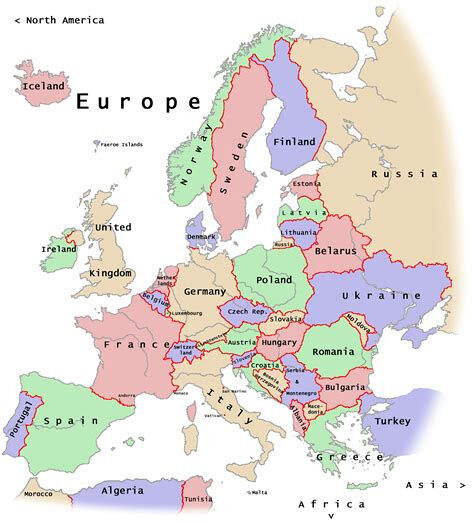Should you move to Europe? Or just visit for extended stays?
We were frustrated by America, so we left. What are the pros and cons of your doing it too?


Many Americans, including quite a few LGBTQ+ ones, are currently very frustrated with life in America.
Michael and I can relate. We decided to leave America in 2016, the night Donald Trump was elected president. We’ve spent the last seven years as nomads, living in Europe about half that time.
(Important caveats: just because we left America doesn’t mean we’ve given up “the fight.” And, yes, leaving America requires some degree of privilege.)
Pack your bags, we’re going on an adventure
Subscribe to our weekly newsletter for the best LGBTQ+ travel guides, stories, and more.
Subscribe to our Newsletter today
Americans seem to have two views on Europe, depending on their political beliefs.
Europe is a perfect paradise with no social problems, and where Rep. Alexandria Ocasio Cortez’s views would make her a moderate conservative.
or
Europe is an over-regulated, dysfunctional hell-hole where innovation is discouraged and ambition goes to die.
In fact, there’s some truth to both these statements — except for the bit about Alexandria Ocasio Cortez, which is complete nonsense. She has very liberal views even here in Europe and is really liberal on social issues.
Obviously, Europe is a massive area — slightly larger than the United States, with more than twice the total population — and it’s made up of somewhere between 44 and 50 different countries (depending on how you define “Europe”).
In short, generalizations are silly.

And yet, “Europe” is different enough from America that some generalizations are possible. And Europe is different in ways that have surprised me: it’s truly not just America-except-with-free-college-and-universal-health-care.
From Michael’s and my point of view, Europe’s pluses massively outweigh its minuses. This area of the world, especially Western Europe, is much more in sync with our values and priorities than the United States.
Meanwhile, the cost of living in Southern and Eastern Europe is so low for us, relatively speaking, that we find these are very attractive destinations, too.
Whether a move to Europe is right for you depends on how bad you think things have gotten in America — or, ahem, might get after November 5, 2024. But it also depends on your personal values and priorities.
Here are the pros and cons of such a move, at least as this American expat sees them.
Pro: The quality of life is better.
Most Americans have heard how people in Europe work fewer hours, get far more vacation, and have much stronger government “safety nets,” making it far easier for people to raise kids, retire comfortably, and get healthcare.
Well, it’s all very true, at least in Western Europe.
Not long ago, Atlantic Magazine bluntly put it this way: The Best Parenting Advice is Go Live in Europe.
This isn’t just a question of government policies; it’s also a question of culture, which really is different in Europe, and will affect every aspect of your life.
When Michael and I first moved to Italy, I was surprised to find that the entire coworking area where we worked would break for lunch every day—and that lunch would stretch out into a long and lively shared meal that sometimes lasted hours.
The first week, I thought, Is lunch going to last two hours every day? Am I just supposed to accept that I will get less work done here in Italy?
The answer to both those questions turned out to be an unqualified: YES! And after that first wary week, I never regretted it for a second.

Con: Taxes are higher, and wages and productivity are lower.
I personally love the European lifestyle, but it all comes at a cost — literally. Taxes are higher, and wages are lower compared to the United States.
There is a longstanding, raging debate about economic comparisons between the two areas:
- “American salaries are much higher!”
- “Yeah, but Europeans don’t have to pay for things like healthcare!”
- “Just admit the European economy isn’t nearly as dynamic as the American one!”
- “You admit that all your fancy numbers don’t consider lifestyle factors!”
This guy makes a pretty convincing case that the average American keeps somewhere between $10,000 and $20,000 more per person per year than the average European—and that’s controlled for the cost of living (and not skewed by the mega-rich).
Does all that extra cash make up for America’s insane healthcare system, crazy work hours, expensive colleges, out-of-control housing costs, dysfunctional government, and daily mass shootings?
Well, that’s the question.
But do keep in mind that, as an expat, you may very well be paying very high taxes for things you might never directly benefit from, like education and a generous pension system. And those American Roth IRAs? They may not help you in Europe. You could end up paying taxes on that money twice.
Also, if you’re an entrepreneur, European attitudes might soon frustrate you. American filmmakers have told me flatly, “European film crews simply don’t understand the concept of making movies. When it’s noon, they break for lunch, even in the middle of a shot. And when the clock strikes five, they leave.”
These differing attitudes also apply to European bureaucracies, which can be off-the-charts maddening, and to the contractor you hire to remodel your kitchen.
Finally, be aware that Europe has social problems too, especially lately. It currently also has hard-right governments in Spain, Italy, and even The Netherlands.
While you’ll probably fit right in among the expat and nomad communities, that may be less true of the locals.
Americans are an incredibly transient people. As such, most of us don’t care where anywhere else came from. For most people, being “American” is a state of mind, not a factor of your bloodline.
Europeans aren’t like this. In many cases, families have lived in cities and towns for hundreds of years—sometimes on the same plot of land or even in the same building.
If you move to Europe, you’ll probably make many wonderful European friends. But the locals might never see you as one of their own.
Pro: European cities are much more people-oriented.
In earlier articles, I’ve written about how life is different outside of America—it’s easier to make friends, people are fitter and healthier, families are stronger, and the food is better—and I stand by all of this.
It all goes back to that question of culture.
I’m always amused when I look into American and European cafes and coffee shops. These shops will be crowded in America, but almost everyone will be working on a laptop. In Europe, by contrast, people will be jabbering away with each other (and, yes, often smoking, alas).
Sure, there may be a few people on laptops in European cafes, but they’re almost invariably American expats or nomads.
European culture is also expressed in how the cities are arranged and organized. They’re denser and more people-oriented, with centralized parks and plazas, and much more vibrant public transportation options.
When we lived in Istanbul in 2021, there were probably a hundred cafes or restaurants within just 100 meters of our apartment. Meanwhile, the vast, seamless, efficient subway, trolley, bus, and ferry system got us all over this massive city of 16 million people. You could even pay for a taxi with your transit card.
Meanwhile, when Michael and I lived in Seattle (and Los Angeles before that), it seemed like we were always stuck in traffic. And even though cars are supposedly all about “freedom,” that insane traffic ruled our days and made our lives miserable. After a while, we didn’t even want to leave the house.
In most places in America, not having access to a car is almost inconceivable. In most places in Europe, having a car is a luxury for the wealthier classes — and it is rarely needed anyway.
As for Michael and me, we’re seldom in a car these days — and yet we’re always out and about. Ironically, we finally feel free now that we’ve given up our car.

Con: Your living space will be a lot smaller and more modest. And you’ll have a lot fewer “things.”
Why are public spaces so fabulous in Europe? Because private spaces are so much more modest. Apartments are smaller, and far fewer people own cars. Suburbs, when they exist at all, are denser too.
Rather than “backyards,” people typically have “balconies” (if they’re really lucky). And, incidentally, your washing machine may very well be on that balcony — and don’t even think about having a dryer. That’s what the clothesline is for. Also, forget about choosing from among 20 different kinds of cereal or buying in bulk — that isn’t done here. Most stores have fewer options.
Americans, meanwhile, place a very high value on “things”: a nice car for every person, a big house, lots of luxuries and conveniences, and the latest technology and gadgets of every kind. Even most Americans who don’t have all these things aspire to get them one day.
I’ve heard Americans are materialistic all my life, but I didn’t know how truly extreme their consumerism is until I left the country.
I won’t say that Europeans don’t like conveniences — they’re human, after all. But the priorities really are completely different here.
And things are certainly comfortable enough. There are those who say that if you live in a developed country (and you’re not poor), life is essentially equally good wherever you are. It just depends on exactly what you want your priorities to be. Do you want a big lawn, big stores, and a big television? Or do you prefer old-world charm, a more walkable lifestyle, and much more socializing with family and friends?
I recently read a snarky comment about how the TV show Friends screwed up the entire Millennial generation because it told them that fabulous New York apartments and easy, laid-back jobs are the “norm” in life, something to be expected.
But the truth is, you can’t have it all. You have to choose. And Europe and America have made remarkably different choices.
Pro: There are lots of ways to move to Europe.
Here are some of the ways Americans can live in Europe full-time.
- Apply for citizenship via your ancestry. This is especially easy if you have ancestors from Greece, Italy, Poland, Ireland, Germany (if you have ancestors killed by Nazis), and (especially) Hungary, where even great-grandparents can qualify. Better still, most European countries allow for dual citizenship.
- Travel on tourist visas. You generally can’t stay in any country longer than 90 days at a time. But one European country, Georgia, which is absolutely lovely, grants tourist visas of one year simply upon arrival.
- Get a long-term visa. Options include:
- A student visa.
- A work visa (through an existing job).
- A talent visa (if you have a particular skill).
- An investment or “golden” visa (which is very generous, often not having any residency requirement at all. But this visa also requires a sizable domestic investment, 400,000 euros or more, although that can frequently include the real estate where you live).
- A business or entrepreneur visa (which requires you to start a local business).
- A spouse/partner visa (if you marry a local citizen).
- A digital nomad visa, which more and more countries offer, allows people to stay long-term in a country and work remotely in exchange for certain fees and/or tax liabilities.
- A retirement visa. Don’t let the name fool you: you don’t need to be retired!
And here’s some good news: if you’re granted a long-term visa or citizenship in any country that is part of the 29-nation “Schengen Zone” (which includes most of Western Europe), you may immediately or eventually be allowed unrestricted travel (and sometimes even residency) in most of the European continent.

Con: Visas can be expensive and complicated, and can restrict the work and travel you’re allowed to do.
Many visas are expensive, requiring fees, minimum incomes, and/or considerable investments in the local economy. Meanwhile, some visas won’t allow you to take a local job, or they have other limitations too.
Do you want to move to one of the supposedly wondrous Scandinavian countries? Good luck with that, because they make it extremely difficult.
Many visas also have “residency” requirements.
Finally, many countries are phasing out the easiest and “best” visa, the golden visa. In some cases, these have driven up local housing prices.
Michael and I are digital nomads, but we’ve never used digital nomad visas. Instead, we travel on the aforementioned tourist visas. The wrinkle is that Americans can’t stay anywhere in the Schengen Zone on a tourist visa for more than 90 days in any 180 period.
On the other hand, this restriction has forced us to periodically live in non-Schengen Zone countries in Central and Eastern Europe, and we’ve ended up loving that. It’s great for the pocketbook, too.
The cold, hard truth is that you can’t simply move to Europe on a whim unless a handsome European prince falls in love with you over your Christmas holiday.
But becoming a digital nomad is a really good option, especially if you’re retired or have a remote job that pays an American-sized salary.
In fact, if you never stay in any country longer than a hundred and eighty days in a year, you don’t have to pay any income taxes, not even back in America.
It’s the ultimate life hack.
One final thought
If you are considering leaving America for Europe, I’m sure this won’t be the only article you’ll read.
You should read them all, no matter how overwhelmed they make you feel.
Leaving the country is overwhelming — and a fair bit of work.
But after marrying Michael, it’s also, hands down, the best decision I’ve ever made.
Brent Hartinger and Michael Jensen, are a gay “digital nomad” couple traveling the world continuously, living in different countries for anywhere from one to three months at a time. Subscribe to their newsletter at BrentAndMichaelAreGoingPlaces.com for all of their travel tips and stories.

 Mark
Mark 





